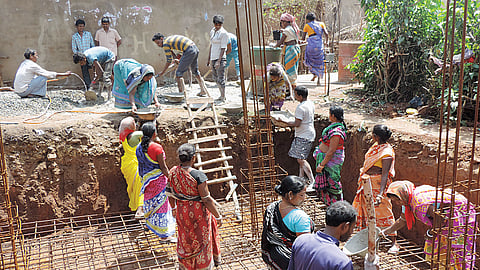Tata Sponge has made Birikela open defecation free, benefiting 1,100 families
A study conducted by the Kalinga Institute of Social Science in 2015 revealed that only 2 per cent of the population in the hamlets surrounding Tata Sponge Iron Limited used toilets. It further identified that the cause of the absence of toilets was not poverty but the mindset and ignorance of the people towards the hygiene aspects of water and sanitation.
Tata Sponge decided to allocate a large share of its CSR spend on improving basic sanitation, and make Birikela Gram Panchayat, where the company is located, an Open Defecation Free (ODF) Panchayat, benefiting about 1,100 families in the six villages (or 16 hamlets) of Birikela. And thus, Project Swabhiman (as it was named) was conceptualised. A long-term plan was developed to complete this project in five years, in a phased manner.
The preparatory plans met with several unprecedented challenges, which caused a delay in implementation. For example, the tradition of defecation outside houses has been an age-old habit, as retention of faeces in any form inside the boundary of the house was deemed taboo. Therefore, despite having sufficient money to build toilets, the residents continued to defecate in the open. Also, the villagers felt that it was sufficient for them to just agree to shift from their age-old custom, and the company will do the rest. However, to make the project sustainable, it was important to secure collaboration of the beneficiary people, through contribution to the project. It was felt that after the construction of a toilet-cum-bathroom (TBR) and piped water, an arrangement had to be made for the maintenance of the water source and other regular needs. During the initial approach, no one came forward to take the onus. They also had to be made skilled in managing the requirement.
To ensure sustainability, Tata Sponge decided to implement the project on a public-private partnership model – a convergence of partnerships among Tata Sponge, Gram Vikas (the implementation partner), the Government of Odisha and the reference communities. Accordingly, the company approached the Rural Water & Sanitation Services (RWSS) for support, which came in the form of approval of the project and an assurance of a subsidy of Rs12,000.
The project began with a series of interrelated activities to enable the company to secure buy-ins from the beneficiary group. These included a series of door to door campaigns, several street players, exposure visits to villages where such programmes had attained a certain degree of maturity and also continuous encouragement to spare land and contribute resources for the construction of TBRs. Total cost of a TBR with piped water facility cost the company about Rs59,000 per unit, while the expectation from the beneficiary was 10 per cent of the total cost, which came mostly in the form of contribution of labour and arranging boulders for the twin pits.
Along with the construction work, which actually started two years after the programme was launched (the time taken to onboard the beneficiary group), Gram Vikas simultaneously worked on other softer aspects such as the formation of committees (known as WatSan Committees) which largely comprised women, imparting training for ground-level motivators to sensitise and trigger the emotions of the community towards sanitation and maintenance of the facilities. Besides individual houses, the company provided free toilets in many schools too, which had actually been one of the reasons for a drop in attendance.
In the four years since the groundwork started, there has been a complete reversal in the approach of the villagers who are now willing to participate in the project, thanks largely to the youth and the women in particular, who came out in large numbers. Out of the 16 hamlets, TBRs in 10 have been completed. Meanwhile, continuous follow-up is being made with the local administration to facilitate the provision of water in every village, in view of the prohibitive cost of providing water, which could not be extended by Tata Sponge beyond a few hamlets. Anjali Khuntia, president of one of the WatSan Committees had this to say, “This is our true Swabhiman, a project which ensures our safety and self-respect with the provision of toilet and bathroom for each woman in the village.”

